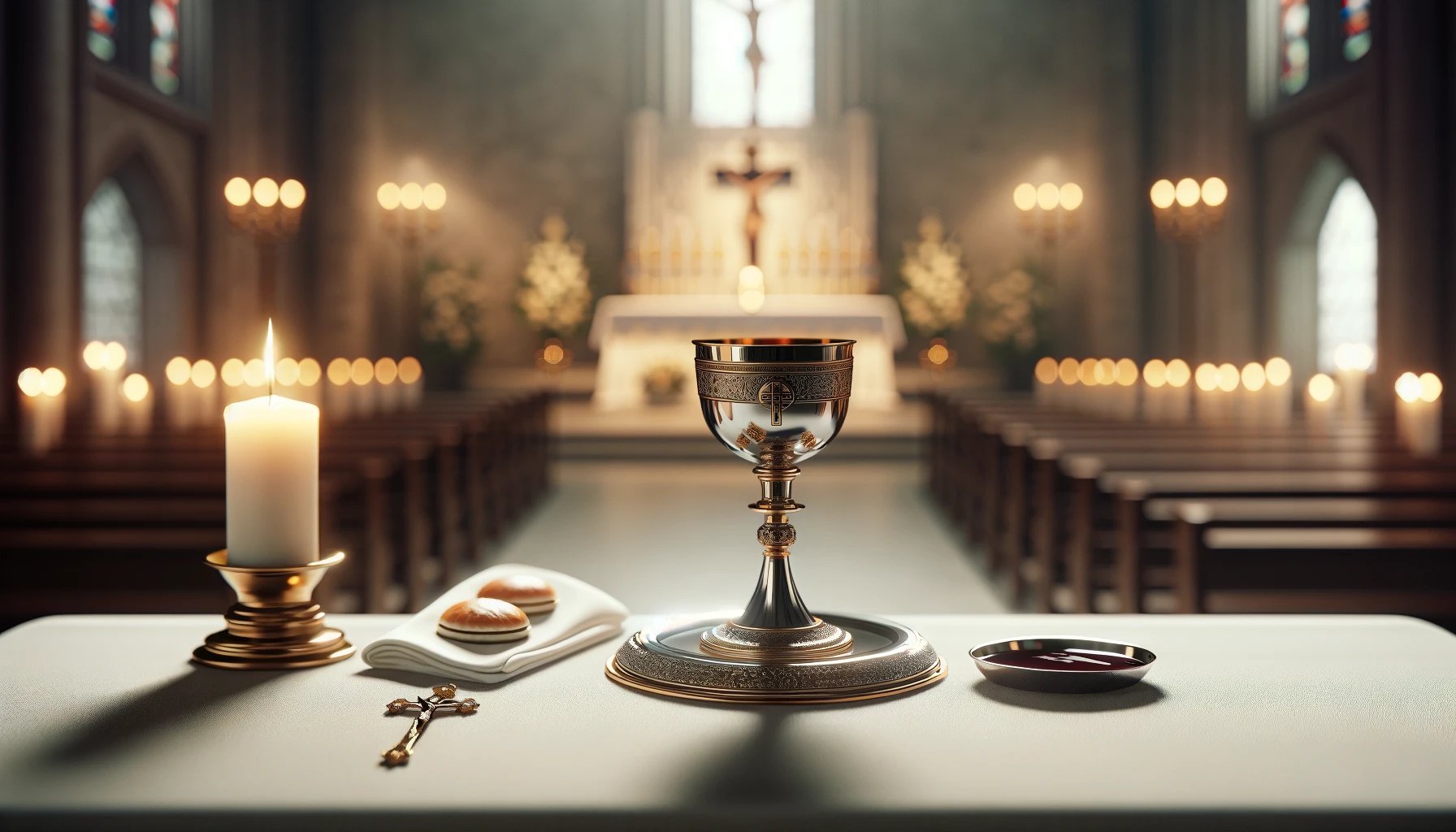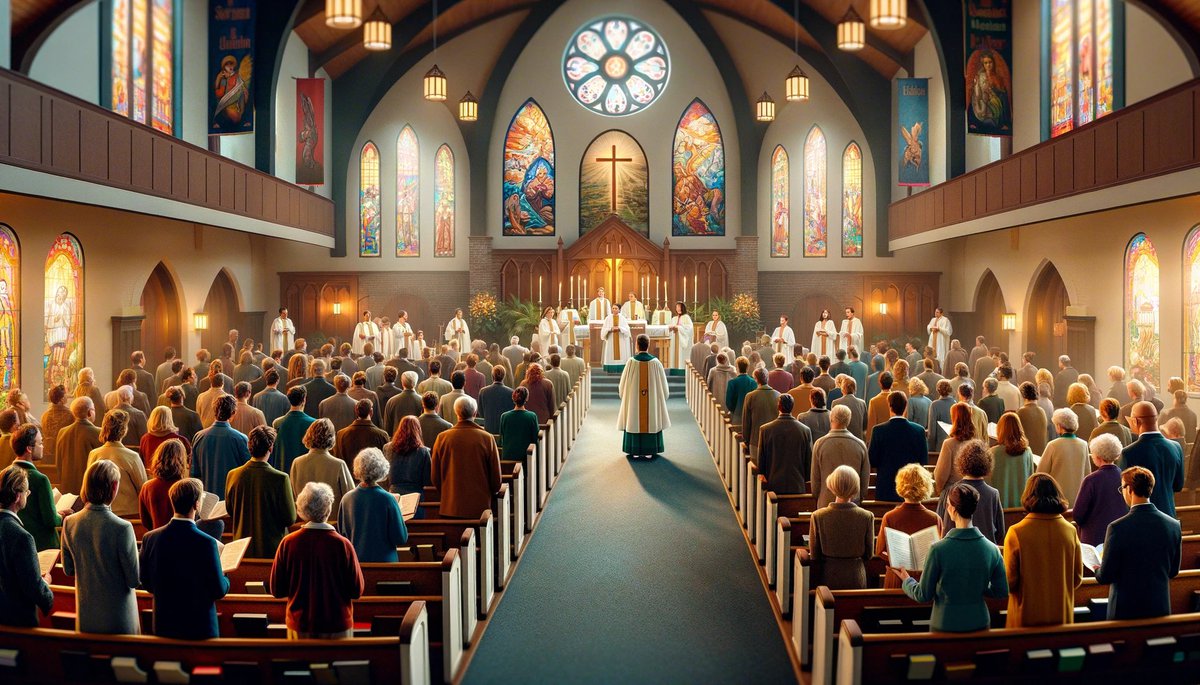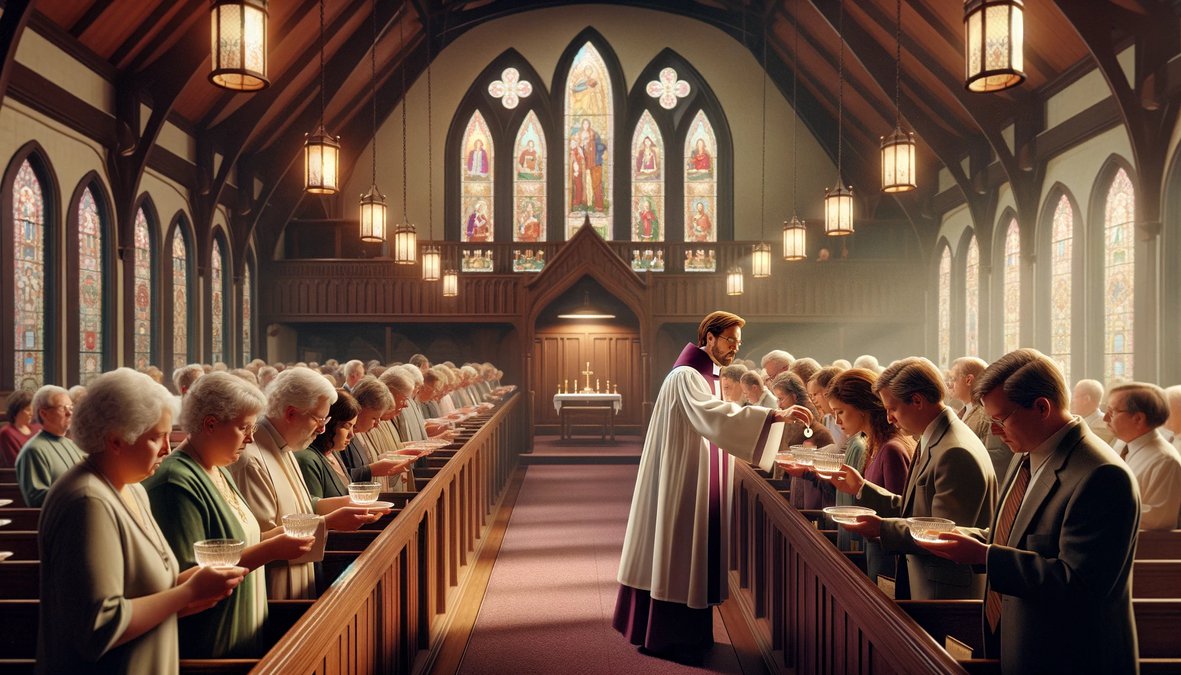Home>Theology and Spirituality>What Protestants Can Take Communion At Catholic Churches


Theology and Spirituality
What Protestants Can Take Communion At Catholic Churches
Published: February 24, 2024
Jason DeRose, Managing Editor at Christian.net, uses his expertise in religion and journalism to deepen understanding of faith's societal impacts. His editorial leadership, coupled with a strong academic background, enriches the platform’s diverse content, earning him recognition in both journalism and religious circles.
Discover which Protestants are allowed to take communion at Catholic churches and learn about the theological and spiritual considerations involved. Explore the guidelines and implications for interfaith communion.
(Many of the links in this article redirect to a specific reviewed product. Your purchase of these products through affiliate links helps to generate commission for Christian.net, at no extra cost. Learn more)
Table of Contents
Introduction
The act of communion holds profound significance in the Christian faith, symbolizing the spiritual union with Christ and fellow believers. However, the question of who is permitted to partake in communion at Catholic churches can be a source of uncertainty for many individuals, particularly those from Protestant denominations. This article aims to shed light on this topic, providing clarity and understanding for those seeking to participate in the sacrament of communion within a Catholic context.
Communion, also known as the Eucharist, is a central aspect of Catholic worship, representing the commemoration of Jesus Christ's Last Supper with his disciples. During this sacred ritual, bread and wine are consecrated and consumed by the faithful, signifying the body and blood of Christ. The Catholic Church views the Eucharist as a fundamental expression of faith and a means of receiving spiritual nourishment.
As we delve into the intricacies of communion within the Catholic tradition, it is essential to approach this subject with sensitivity and respect for the diverse beliefs and practices within the broader Christian community. By gaining a deeper understanding of the Catholic Church's stance on communion and the guidelines surrounding participation, individuals from Protestant backgrounds can navigate this aspect of Catholic worship with reverence and discernment.
Understanding the Catholic Church's stance on communion
The Catholic Church's perspective on communion is deeply rooted in its theological and doctrinal teachings. Central to this stance is the belief in the Real Presence of Christ in the Eucharist. According to Catholic doctrine, during the consecration of the bread and wine by a priest, a transformation occurs whereby the substances of the bread and wine become the actual body and blood of Jesus Christ, while retaining the appearance of bread and wine. This concept, known as transubstantiation, is a cornerstone of Catholic Eucharistic theology.
The Catholic Church regards the Eucharist not merely as a symbolic ritual but as a sacrament imbued with profound spiritual significance. It is considered a means of encountering the living Christ, receiving grace, and fostering unity within the body of believers. The act of receiving communion is viewed as a participation in the very sacrifice of Christ and a source of spiritual nourishment for the journey of faith.
Furthermore, the Catholic Church emphasizes the communal aspect of the Eucharist, underscoring the unity and fellowship it fosters among believers. The celebration of the Eucharist is seen as a sacred gathering of the faithful, reinforcing the bonds of the Christian community and expressing the shared faith in Christ's redemptive work.
In light of these theological convictions, the Catholic Church approaches the administration of communion with reverence and solemnity. It upholds specific guidelines and disciplines to ensure the integrity of this sacramental practice, reflecting the Church's commitment to preserving the sacred nature of the Eucharist.
Understanding the Catholic Church's stance on communion provides valuable insight into the significance and reverence accorded to this sacrament within the Catholic tradition. This foundational understanding serves as a backdrop for exploring the eligibility and guidelines for participation in communion at Catholic churches, particularly for individuals from Protestant backgrounds.
Who is allowed to take communion at Catholic churches?
In the Catholic Church, the reception of communion is regulated by specific guidelines that reflect its theological and sacramental significance. According to Catholic doctrine, those who are considered eligible to receive communion include baptized Catholics who are in a state of grace, having confessed any mortal sins through the sacrament of reconciliation. This requirement underscores the importance of spiritual preparation and purity of heart when partaking in the Eucharist.
Additionally, Catholics are expected to observe the Eucharistic fast, abstaining from food and drink (with the exception of water and medicine) for at least one hour before receiving communion. This practice is intended to cultivate a spirit of reverence and attentiveness as individuals approach the sacrament.
Furthermore, the Catholic Church extends the invitation to receive communion to members of the Eastern Orthodox Churches, recognizing the validity of their sacraments and the shared belief in the Real Presence of Christ in the Eucharist. This inclusivity reflects the Church's commitment to fostering unity among the various branches of Christianity.
Moreover, individuals who have been received into full communion with the Catholic Church, such as those who have completed the Rite of Christian Initiation for Adults (RCIA), are considered eligible to partake in the Eucharist. This process involves catechesis, the reception of the sacraments of initiation (baptism, confirmation, and Eucharist), and a public profession of faith, culminating in full incorporation into the Catholic faith community.
Additionally, Catholic teaching acknowledges the possibility of non-Catholic Christians, under certain circumstances, being allowed to receive communion in Catholic churches. This may occur when individuals from other Christian traditions demonstrate a genuine belief in the Catholic understanding of the Eucharist, hold a reverent disposition, and are unable to access the sacraments in their own faith community.
Understanding the criteria for eligibility to receive communion at Catholic churches illuminates the emphasis placed on spiritual readiness, doctrinal unity, and reverence for the sacrament. These guidelines serve to uphold the integrity of the Eucharist while also reflecting the Catholic Church's commitment to fostering Christian unity and inclusivity within the context of the Eucharistic celebration.
Can Protestants take communion at Catholic churches?
The question of whether Protestants can partake in communion at Catholic churches is a topic that evokes diverse perspectives and theological considerations. From a Catholic standpoint, the reception of communion is governed by specific guidelines rooted in sacramental theology and ecclesial discipline. According to Catholic doctrine, the Eucharist is regarded as a sacred sacrament that embodies the Real Presence of Christ, signifying a profound spiritual union with the body and blood of Jesus.
In the context of communion at Catholic churches, the general norm is that participation in the Eucharist is reserved for baptized Catholics who are in a state of grace and in accordance with the Church's teachings. This criterion is based on the belief in the sacramental nature of the Eucharist and the theological understanding of the Church as the guardian of the sacraments.
However, the Catholic Church also acknowledges the potential for non-Catholic Christians, including Protestants, to seek participation in the Eucharist under specific circumstances. While the general discipline upholds the requirement of full communion with the Catholic Church for receiving the Eucharist, there are instances where non-Catholic individuals may be permitted to partake in communion.
In line with the principles of ecumenism and pastoral sensitivity, the Catholic Church recognizes the spiritual yearning of non-Catholic Christians to receive the Eucharist, particularly in situations where they are unable to access the sacraments within their own faith communities. This recognition is grounded in the shared belief in Christ's presence in the Eucharist and the desire to foster Christian unity and understanding.
Moreover, the possibility of Protestants receiving communion in Catholic churches may be considered in cases where they demonstrate a genuine belief in the Catholic understanding of the Eucharist, hold a reverent disposition, and approach the sacrament with profound respect and discernment. This discernment is guided by pastoral discretion and a recognition of the individual's spiritual journey and intentions.
It is important to note that the decision regarding the participation of Protestants in communion at Catholic churches is subject to the discernment of the local bishop or pastor, taking into account the specific circumstances and the pastoral care of those seeking to receive the Eucharist. This approach reflects the Catholic Church's commitment to upholding the integrity of the Eucharist while also embracing a spirit of openness and understanding towards non-Catholic Christians.
In essence, while the general norm reserves the reception of communion for baptized Catholics, the Catholic Church acknowledges the potential for Protestants and other non-Catholic Christians to receive the Eucharist in specific situations, guided by pastoral discernment and a shared reverence for the sacrament of the Eucharist.
Guidelines for Protestants taking communion at Catholic churches
For Protestants considering participation in communion at Catholic churches, it is essential to approach this aspect of worship with a deep sense of reverence, understanding, and respect for the theological and sacramental significance attributed to the Eucharist within the Catholic tradition. While the general norm reserves the reception of communion for baptized Catholics, the Catholic Church acknowledges the potential for Protestants and other non-Catholic Christians to receive the Eucharist in specific situations, guided by pastoral discernment and a shared reverence for the sacrament of the Eucharist.
-
Respect for Catholic Beliefs: Protestants seeking to partake in communion at a Catholic church should approach the Eucharist with a genuine respect for Catholic beliefs regarding the Real Presence of Christ in the Eucharist. This entails an acknowledgment of the theological understanding of transubstantiation and a willingness to honor the sacred nature of the sacrament within the Catholic faith tradition.
-
Reverent Disposition: It is imperative for Protestants desiring to receive communion in a Catholic church to approach the Eucharist with a reverent disposition. This involves a deep sense of solemnity, humility, and spiritual readiness, reflecting an understanding of the sacredness of the Eucharistic celebration and a sincere desire to encounter the presence of Christ in the sacrament.
-
Pastoral Discernment: Protestants should engage in open and honest dialogue with the local bishop or pastor regarding their intention to receive communion at a Catholic church. Pastoral discernment plays a crucial role in assessing the individual's spiritual journey, beliefs, and disposition, allowing for a thoughtful and considerate approach to the question of participation in the Eucharist.
-
Unity and Christian Fellowship: The desire to partake in communion at a Catholic church should be accompanied by a genuine yearning for unity and fellowship within the body of Christ. Protestants should approach the Eucharist with a spirit of ecumenical openness, recognizing the shared faith in Christ and the aspiration for Christian unity across denominational boundaries.
-
Spiritual Preparation: Prior to seeking communion at a Catholic church, Protestants should engage in personal reflection, prayer, and spiritual preparation. This may involve an examination of one's own faith journey, a deepening of understanding regarding the significance of the Eucharist, and a sincere commitment to approaching the sacrament with reverence and discernment.
By adhering to these guidelines, Protestants can navigate the prospect of receiving communion at a Catholic church with a profound sense of respect, understanding, and spiritual readiness. These considerations underscore the importance of approaching the Eucharist within the Catholic tradition with a deep appreciation for its theological and sacramental significance, while also reflecting the Catholic Church's commitment to fostering Christian unity and understanding across diverse Christian traditions.
Conclusion
In conclusion, the question of whether Protestants can take communion at Catholic churches is a complex and nuanced issue that intertwines theological considerations, sacramental significance, and the pursuit of Christian unity. The Catholic Church's stance on communion reflects its deep-rooted theological convictions, emphasizing the Real Presence of Christ in the Eucharist and the sacramental nature of the ritual. While the general norm reserves the reception of communion for baptized Catholics, the Church also acknowledges the potential for non-Catholic Christians, including Protestants, to receive the Eucharist under specific circumstances.
The guidelines for Protestants seeking to partake in communion at Catholic churches underscore the importance of approaching the Eucharist with reverence, respect for Catholic beliefs, and a genuine desire for Christian unity. The principles of pastoral discernment, spiritual readiness, and a reverent disposition serve as guiding factors for individuals navigating the prospect of receiving communion within the Catholic tradition.
It is essential to recognize that the question of Protestants taking communion at Catholic churches is not solely a matter of doctrinal adherence but also encompasses the broader themes of ecumenism, Christian fellowship, and the shared reverence for the Eucharist as a symbol of spiritual nourishment and unity in Christ. The Catholic Church's openness to considering the participation of non-Catholic Christians in the Eucharist reflects a spirit of inclusivity and understanding, rooted in the desire to foster mutual respect and dialogue among diverse Christian traditions.
Ultimately, the prospect of Protestants taking communion at Catholic churches calls for a balanced approach that honors the theological distinctiveness of the Catholic Eucharistic celebration while also embracing the shared faith in Christ that unites Christians across denominational boundaries. By engaging in thoughtful dialogue, spiritual discernment, and a genuine respect for the sacramental significance of the Eucharist, individuals from Protestant backgrounds can navigate this aspect of Catholic worship with a deep sense of reverence and understanding.
As the pursuit of Christian unity and mutual respect continues to shape interdenominational relationships, the question of Protestants taking communion at Catholic churches serves as a poignant reflection of the ongoing journey towards greater understanding, cooperation, and shared reverence for the central tenets of the Christian faith.














